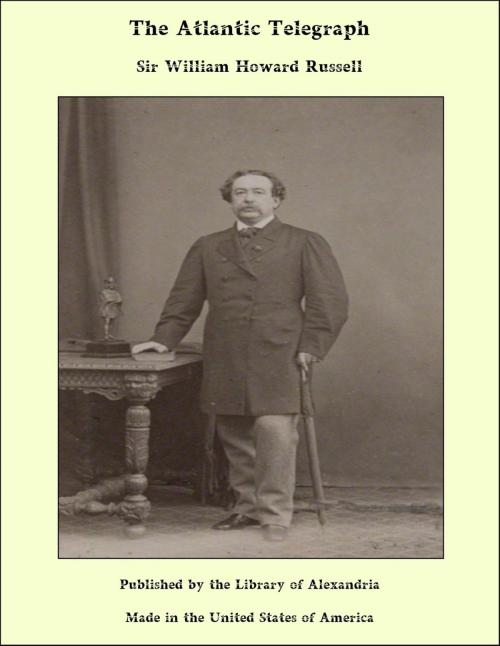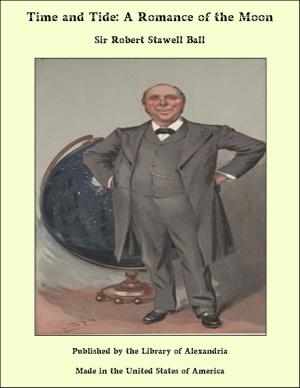| Author: | Sir William Howard Russell | ISBN: | 9781465554833 |
| Publisher: | Library of Alexandria | Publication: | March 8, 2015 |
| Imprint: | Language: | English |
| Author: | Sir William Howard Russell |
| ISBN: | 9781465554833 |
| Publisher: | Library of Alexandria |
| Publication: | March 8, 2015 |
| Imprint: | |
| Language: | English |
I SHALL not detain the readers of this brief narrative with any sketch of the progress of electrical science. There are text-books, cyclopædias, and treatises full of information concerning the men who worked in early days, and recording the labours of those who still toil on, investigating the laws and developing the applications of the subtle agency which has long attracted the attention of the most acute, ingenious, and successful students of natural philosophy. For the last two centuries the greater number of those whose names are known in science have made electrical experiments a favourite pursuit, or turned to them as an agreeable recreation from severer studies. The rapidity with which electricity travels for considerable distances through insulated conductors soon suggested its use as a means of transmitting intelligence; but the high tension of the currents from friction machines, and the difficulty of insulating the conductors, were practical obstacles to the employment of the devices, some of them ingenious, recommended for that purpose from year to year. Otto Von Guericke, and his globe of sulphur; Grey, with his glass tube and silken cords; and Franklin, with his kite, were, however, the precursors of the philosophers who have done much, and whose successors may yet do much more, for the world. It is not easy to decide whether it is the man who gives a new idea to the world, or he who embodies that idea in a form and turns it into a fact, who is deserving of the credit to be assigned to any invention. A vague expression of belief that a certain end may be attained at a future period by means then unknown does not constitute a discovery, and does not entitle the person who utters it, verbally or in writing, to the honour which is due to him who indicates specifically the way of achieving the object, or who actually accomplishes it by methods he has either invented or applied. The Marquis of Worcester certainly did not invent the steam-engine; neither did Watson, Salva, Sœmmering, or Ronalds, or any other of the many early experimentalists, discover electric telegraphy. But there is a degree of credit due to those who, contending with imperfect materials and want of knowledge, persist in working out their ideas, and succeed in rescuing them from the region of chimæras. The inventions of one render capable of realisation the ideas of another, which but for them had remained dreams and visions. The introduction of a novel product into commerce, or the chance discovery of some property in a common material, may draw a project out of the limbo of impracticabilities. A suggestion at one period may be more valuable than an invention at another, and adaptations may be more useful than discoveries. Indeed, when the testimony on which men’s reputations, as finders or makers, rest, is critically examined, a suspicion is often generated that there have been many Vespuccis in the world who have given names to places they never found, and taken or received credit for what they never did.
I SHALL not detain the readers of this brief narrative with any sketch of the progress of electrical science. There are text-books, cyclopædias, and treatises full of information concerning the men who worked in early days, and recording the labours of those who still toil on, investigating the laws and developing the applications of the subtle agency which has long attracted the attention of the most acute, ingenious, and successful students of natural philosophy. For the last two centuries the greater number of those whose names are known in science have made electrical experiments a favourite pursuit, or turned to them as an agreeable recreation from severer studies. The rapidity with which electricity travels for considerable distances through insulated conductors soon suggested its use as a means of transmitting intelligence; but the high tension of the currents from friction machines, and the difficulty of insulating the conductors, were practical obstacles to the employment of the devices, some of them ingenious, recommended for that purpose from year to year. Otto Von Guericke, and his globe of sulphur; Grey, with his glass tube and silken cords; and Franklin, with his kite, were, however, the precursors of the philosophers who have done much, and whose successors may yet do much more, for the world. It is not easy to decide whether it is the man who gives a new idea to the world, or he who embodies that idea in a form and turns it into a fact, who is deserving of the credit to be assigned to any invention. A vague expression of belief that a certain end may be attained at a future period by means then unknown does not constitute a discovery, and does not entitle the person who utters it, verbally or in writing, to the honour which is due to him who indicates specifically the way of achieving the object, or who actually accomplishes it by methods he has either invented or applied. The Marquis of Worcester certainly did not invent the steam-engine; neither did Watson, Salva, Sœmmering, or Ronalds, or any other of the many early experimentalists, discover electric telegraphy. But there is a degree of credit due to those who, contending with imperfect materials and want of knowledge, persist in working out their ideas, and succeed in rescuing them from the region of chimæras. The inventions of one render capable of realisation the ideas of another, which but for them had remained dreams and visions. The introduction of a novel product into commerce, or the chance discovery of some property in a common material, may draw a project out of the limbo of impracticabilities. A suggestion at one period may be more valuable than an invention at another, and adaptations may be more useful than discoveries. Indeed, when the testimony on which men’s reputations, as finders or makers, rest, is critically examined, a suspicion is often generated that there have been many Vespuccis in the world who have given names to places they never found, and taken or received credit for what they never did.















